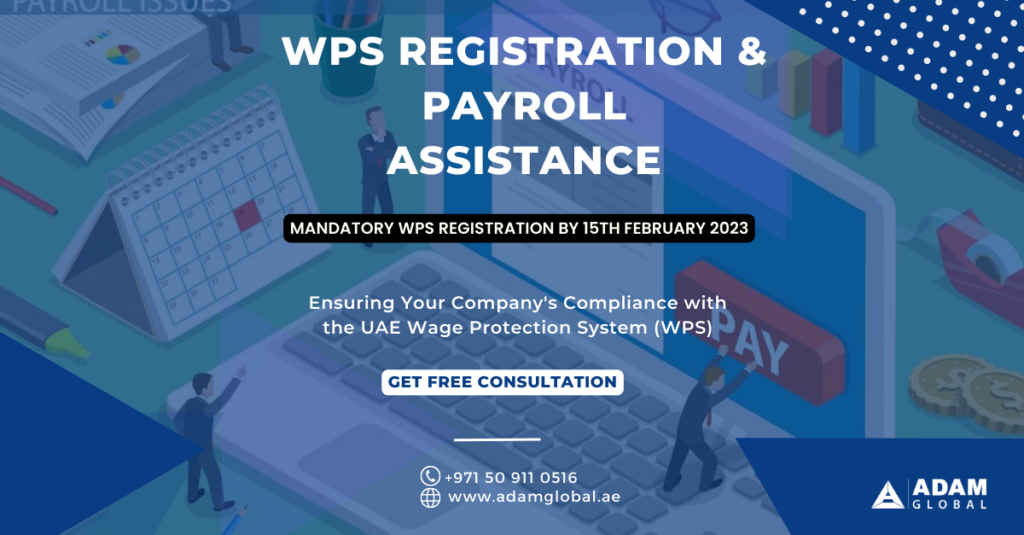It’s no more a secret that the UAE, particularly Dubai, is an expensive place to live. And it goes without saying that a swarm of UAE expatriates lives pay cheque to pay cheque. If they expect their salaries to be paid on time, are they expecting too much?! According to Law, private sector employers in the UAE must disburse their staff’s salaries through the Wages Protection System to steer clear of penalties and fines.
Implementation of Wages Protection System (WPS)
Receiving wages on time is employees’ right, and disturbing wages timely is employers’ duty. And ensuring that employers are fulfilling their duty and employees’ rights are protected is what concerns the UAE government. That’s why the country brought into existence the Wages Protection System (WPS) in 2019. The system has successfully stemmed labour disputes, retained wage provisions, and abstained from obtaining a large amount of money at the workplace. Every employer in the UAE must register in the WPS, if they don’t the ministry shall not proceed with any transactions with the companies owned by that person, clearly states the new decree. Companies must pay wages within a period of 10 days from the registered payday under the wages protection system (WPS). The violators will be subject to serious penalties such as suspension of new work permits, a notice to the public prosecution and fines under the New Decree. Small establishments with less than 50 workers may be barred from new work permit issuance for delaying wage payments. Penalties intensify with further delay in paying wages.
Understand Wages Protection System (WPS)
The Wages Protection System in the UAEis nothing but a modern, efficient electronic system designed by the Central Bank of the UAE and MoHRE to facilitate private entities in transferring salaries to their workers via banks, bureaux de change, and financial institutions authorised to deliver the service. WPS-registered private sector companies are required to generate salary files for their workforce in a Ministry-provided confidential database and forward them to their respective banks for wage distribution. This way, the system helps the Ministry to ensure that employees are paid agreed-upon wages on time. The system covers all establishments registered with the Ministry across all sectors to benefit diverse classes of labour. Furthermore, the implementation of WPS showcases the UAE’s constant efforts toward being in a leading role in the region, and projects the country as an example worth emulating in the following areas:
- Restating commitment to protect workers’ wages;
- Offering innovative solutions that enable companies to protect their own interests and lower the time and effort required to disburse salaries and wages;
- Taking serious measures to enhance job security in order to beef up work relationships in the UAE and fend for the rights of all parties involved;
- Rooting transparency and competitiveness;
- Ensuring that MoHRE is regularly and continuously updated on wages data in the private sector in order to guarantee that employers satisfy their salary commitments;
- Acting proactively to slash labour disputes concerning wages.
Consequences Companies May Face on Delaying/Not Paying Wages on Time
The Ministry of Human Resources and Emiratisation (MoHRE) published a decree that presents new penalties against companies who fail to pay wages on time. If wages are not paid to employees within 15 days from the due date, the employers will be considered late in paying, unless otherwise is specified in the employment contract. According to the New Decree, if a company:
- defaults on payment, the ministry will halt issuing that company any more work permits starting from the 16th day of delay. Companies with 50 or more workers will be subject to field inspections from the ministry and warnings if wages are not paid 17 days after the due date.
- delays wage payment for a month from the due date, the ministry shall notify the judicial authorities and other affiliated parties to take all required disciplinary actions against it. Further, the ministry will cease other companies owned by the same employer and ban any forthcoming projects by the same owner.
- continues not to pay wages, the ministry shall take essential steps to use the company’s bank guarantee, and the affected employees would be permitted to move to other companies.
- fails to make wage payments for 60 days from the due date, then administrative fines shall follow, in addition to registered fines for failing to pay wages after a month from the due date, as stated above in the first scenario. Administrative fines could be AED 5,000 per worker, up to a maximum of AED 50,000 when multiple workers complain about delayed wages for more than 60 days.
- promptly pays the wages during the first month, the ministry would remove the ban on work permit issuance, however, the ban lasts for 60 days if the company fails to pay wages for more than two months.
- hires less than 100 employees, the current regulations shall apply in case of wage delays, which include work permits ban and fines and court referrals, only if the company fails to pay wages within 60 days. Additionally, if the company repeats such violations over the span of one year, the ministry shall apply penalties declared for companies employing more than 100 workers.
Parties from the Ministry Partners Targeted by WPS
Workers: All individuals employed in the private sector who are working for some agreed-upon wages and hold a labour card granted by the Ministry;
Employers: Owner of a company registered with the Ministry that employs one or more individuals to take work from them in return for agreed-upon wages;
Banks: A financial institution holding employers’ corporate accounts through which wage transfers are done via WPS to the appointed agent to further distribute to the labours.
Agent: Any bank, bureau de change, or financial institution empowered by the Central Bank of the UAE to provide wages payment services via WPS. The Central Bank of the UAE publishes a regularly updated list of such agents.
Requirements to Join WPS
To be able to subscribe into WPS, the entities in the private sector should:
- register with the Ministry;
- maintain a bank account with any of the UAE banks;
- sign an agreement with any of the agents operating in the UAE to furnish the service. Both the parties shall agree on any service fees and charges;
- transfer workers’ wages via WPS within two weeks of their due date, or on the dates specified in the work contract if wages are paid more frequently than monthly;
- take responsibility for all expenses incurred upon joining WPS, including bank fees, service provider charges, and all other costs. Employers are not permitted to share any costs with workers’ by any means, including deductions from their wages, directly or indirectly;
- Have sufficient funds in their accounts from which workers’ wages are paid, as the agreed-upon wages will be transferred via WPS by the deadlines specified in the Ministerial Resolution No. 788 of 2009.
How does WPS work?
Here’s the working mechanism to apply for WPS in the UAE:
- The institution first starts an account with a UAE bank if it doesn’t have one upon joining the WPS system;
- Then it signs a contract with an authorised UAE WPS agent (either a bank, bureau de change, or a financial institution) to deliver this service and agrees on the services charges;
- For successful service delivery, the company provides salary transfer instructions to its bank along with a precise wages list. A copy of this wages list goes to the WPS agent as well;
- The WPS then electronically shares workers’ detailed wages files and instructions provided by the employer to the Central Bank of the UAE, which is then forwarded to the Ministry of Labour database to confirm that the received details conform to those registered with the Ministry;
- Now WPS sends the approved information to the agent appointed by the employer to make them ready to make payments when it’s time.
Meet Adam Global for Payroll Services in the UAE
Timely wage distribution must be the priority for every business, not just because it is an obligation to avoid penalties, but because the act of timely wage payment strengthens their reputation in the market. As we are a one-stop shop for all kinds of business needs, you may approach our business advisors or payroll services specialists in Dubai if you need professional assistance in fulfilling your obligations to your workforce. We are happy to meet you to know your requirements and serve you with the best. Click here to book a free consultancy with Adam Global payroll experts in Dubai, UAE.



